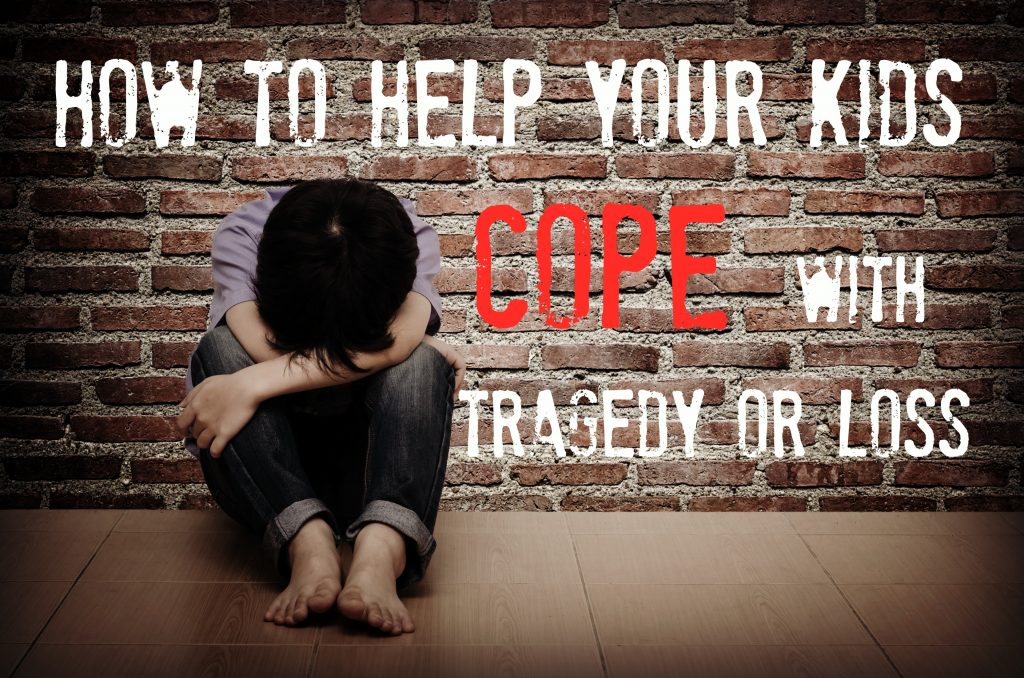Podcast: Play in new window | Download
Subscribe: RSS
We witnessed tragedy unfold this week in Manchester, England when 22 concertgoers, many of them kids, were killed in a horrifying terror attack. This is not a first occurrence. Sadly, it is becoming more common. Our world doesn’t feel safe anymore.
Coincidently, we are entering a Memorial Day holiday weekend here in the USA. It kicks off the summer season of picnics, barbecues, and outdoor fun. The holiday was established to commemorate soldiers who died in active duty.
We live in a time of war. Many of our citizens bear the emotional wounds of loved ones who died on the battlefield. My thoughts and prayers are with them at this time.
Kids Are Confronted By Tragedy and Loss
Kids encounter loss and in some cases tragedy, as we witnessed in Manchester this week. Coping with loss of any type is difficult for adults. For kids, it can be feel more harsh.
In recent days I sat with a family horrified by discovery a loved-one was murdered. The children are minus one parent.
On a personal level, two of my grandchildren suffered the untimely death of a parent when my son-in-law died at 30 years old. I also had a nephew die at 22.
Helping kids cope with tragedy or loss is a primary concern of parents.
[Tweet “Helping kids cope with tragedy or loss is a primary concern of parents.”]
Two primary areas where loss impacts kids (and adults):
- Sense of safety and security – “This makes me feel unsafe. How will I get through this?”
- Sense of vulnerability – “Will it happen again?”
Kids who learned of the Manchester massacre may be afraid of going to concerts or other public events. People close to the event may develop PTSD.
Whether it’s loss by tragedy or untimely death, kids need help coping with loss.
How to help your kids cope with tragedy or loss
#1: Restore a sense of safety
When loss or tragedy occurs, a child/teen’s sense of security is shaken. They have questions.- What will happen to me/us now?
- Will more bad things happen?
- Will someone else die?
#2: Normalize their experience by validating their thoughts and feelings
Create safe space for them to process what’s happening. Give them permission to express thoughts and emotions. Depending on the loss, the intensity can be low or extreme. Do not try to suppress their feelings. Neither should you attempt to minimize what has happened. They will get through the loss sooner if you create a safe environment for emotional release. An effective approach is to be an emotionally-coaching parent. Adopting a posture of calmness and reassurance, will have a direct effect on regulating the intensity of kids’ emotions. Explain that grief doesn’t have a timeline. I often say to my clients who worry if their grief will ever subside, “Sadness will pass, but not today.” Recognize and normalize the stages of grief at an age-appropriate level. Depending on the age of your kids you can validate their feelings and respond to their confusion by observing what stage of grief they experience.- Denial – “This cannot be happening!”
- Anger – “Why is this happening? Who’s fault is it?”
- Bargaining – “Can we make a deal here to bring my loved one back?”
- Depression – “I’m too sad to go back to my life.”
- Acceptance – “I’m at peace with my loss.”
#3: Maintain routines as best as possible under the circumstances
The world does not stop when loss or tragedy strikes. Kids’ school and activity schedules roll along. Your kids may not be ready to return to social activities right away. However, getting them back into routines at some point helps kids cope with loss. Adhering to a routine structure helps reset their baseline of security. Inform school officials, coaches, etc… and discuss transition plan back to school.#4: Discuss coping strategies they can use to get through the loss
The sooner your kids utilize coping strategies, the easier it will be to get through the loss. If they are old enough, I suggest you take a collaborative approach to finding ways to cope.- Starting a new activity, joining a club, something that gets them interacting with other kids
- Art, music, journalling, photo album
- Talking to friends, relatives, or other people they trust
#5 Help them keep the loved-one alive in their own way
Loss is a part of the cycle of life. Assimilating a healthy integration within families is key to help kids cope. Memories and legacy does not have to be buried with the departed. Helping your kids find a way to keep the loved-one alive is important. Here are a few ideas:- Keep a memento
- Re-live special moments, lessons learned, happy times
- Celebrate special occasions
- Scrap book, videos, special clothing, jewelry
- Help for the Hard Times: Getting through loss – by Earl Harp (for teens)
- Healing Your Grieving Heart: 100 practical ideas – by Alan Wolfett
- How it Feels When a Parent Dies – by Jill Krements
- Lifetimes: A beautiful way to explain death to children – by Bryan Mellonie, and Robert Ingpen
- The Grief Recovery Handbook: The Action Program for Moving Beyond Death, Divorce, and Other Losses – by John W. James and Russell Friedman

